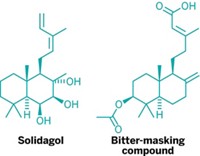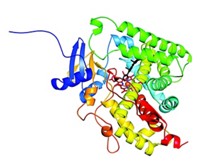Advertisement
Grab your lab coat. Let's get started
Welcome!
Welcome!
Create an account below to get 6 C&EN articles per month, receive newsletters and more - all free.
It seems this is your first time logging in online. Please enter the following information to continue.
As an ACS member you automatically get access to this site. All we need is few more details to create your reading experience.
Not you? Sign in with a different account.
Not you? Sign in with a different account.
ERROR 1
ERROR 1
ERROR 2
ERROR 2
ERROR 2
ERROR 2
ERROR 2
Password and Confirm password must match.
If you have an ACS member number, please enter it here so we can link this account to your membership. (optional)
ERROR 2
ACS values your privacy. By submitting your information, you are gaining access to C&EN and subscribing to our weekly newsletter. We use the information you provide to make your reading experience better, and we will never sell your data to third party members.
Pharmaceuticals
Botanical supplements can inhibit drug-metabolizing enzymes
ACS Meeting News: Licorice extracts used to treat menopausal symptoms could disrupt proper drug metabolism, leading to possible interactions with prescription medication
by Emma Hiolski
August 23, 2017
| A version of this story appeared in
Volume 95, Issue 34

Women seeking relief from menopausal symptoms sometimes reach for botanical dietary supplements. Extracts from licorice, hops, and red clover contain phytoestrogens that help mitigate hot flashes, for example.
These extracts also contain a “mush” of other compounds that act on a multitude of biological targets with possible unintended consequences, said Judy Bolton, head of the medicinal chemistry and pharmacognosy department at the University of Illinois, Chicago.
Bolton organized a session on Monday at the American Chemical Society national meeting in Washington, D.C., to discuss research elucidating the biological effects of botanical supplements. In one talk, researchers reported that licorice extracts can interfere with drug-metabolizing enzymes.
This suite of cytochrome P450 enzymes (CYP) in the liver degrade potentially toxic molecules, including by-products of normal metabolism in the body. These enzymes also are responsible for two-thirds of the breakdown of pharmaceuticals in the body.
Drugs or other molecules people ingest can alter the activity of certain CYP enzymes and disrupt drug metabolism. Inhibiting an enzyme that chews up a certain drug can lead to buildup of that medication, potentially to toxic levels. Enhancing enzyme activity, on the other hand, will accelerate clearance of the drug from the body, rendering the medication less effective.
Studying these kinds of drug-drug interactions is required by the U.S. Food & Drug Administration in pharmaceutical development, but no such requirements exist for botanical supplement development. Richard B. van Breemen, a colleague of Bolton’s at UIC and director of the NIH-funded Center for Botanical Dietary Supplements Research, works to fill in that knowledge gap. His team at the center identifies potentially harmful botanical-drug interactions, including supplements marketed to menopausal women.
At Monday’s session in the Division of Chemical Toxicology, van Breemen presented results of a recent study of extracts from three licorice plant species. They looked for possible interactions between CYP enzymes and the extracts themselves, as well as 14 compounds isolated from the extracts. The team found that many of the extracts and compounds inhibited various CYP enzymes, and that one licorice species in particular, Glycyrrhiza inflata, was extremely potent due to a compound called licochalcone A (Eur. J. Pharm. Sci. 2017, DOI: 10.1016/j.ejps.2017.07.034). Licochalcone A makes up 5% of the plant’s weight, according to their analysis, and irreversibly inhibits the CYP3A4 enzyme, a critical component of the CYP system.
Van Breemen’s team has three phase II clinical studies approved, two of which are already underway, to study how licorice, hops, and red clover extracts interfere with drug metabolism in menopausal women. “By learning more about potential interactions between dietary supplements and drugs, both the drugs and supplements may be used more safely,” he said.
Mary F. Paine, an associate professor of pharmaceutical sciences at Washington State University, said interaction studies such as this one are “very valuable,” as neither the pharmaceutical nor botanical products industries are required to study botanical-drug interactions. The ultimate goal, according to Paine, is to share definitive knowledge with consumers and health care providers about potential adverse botanical-drug interactions. Research that finds answers to those questions is critical, she says, because right now the response a patient will may get is “I don’t know.”






Join the conversation
Contact the reporter
Submit a Letter to the Editor for publication
Engage with us on Twitter